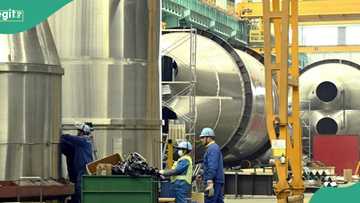Dangote Sets Another Record as His Refinery's Electricity Surpasses Nigeria’s Eleven Years Capacity
- Nigeria managed to add a meager 760 megawatts of power to the national grid in eleven years
- By comparison, the Dangote refinery produced 1,500 megawatts in less time, doubling that amount
- This occurred as the World Bank data indicated that the nation's population has increased from 131 million to 206 million
PAY ATTENTION: Legit.ng Entertainment Awards 2024 Voting Is Alive. Choose the best entertainer in 15 categories for FREE.
Legit.ng journalist Zainab Iwayemi has over 3-year-experience covering the Economy, Technology, and Capital Market.
Nigeria added only 760 megawatts of power to the national grid over eleven years. In contrast, the Dangote refinery doubled that amount, producing 1,500 megawatts in a shorter period.

Source: UGC
Data obtained from the Nigeria Electricity System Operator showed as of June 12, 2024, the average generation of 4,160 MW had increased by 22% from an average of 3,400 MW in November 2013 to the Distribution Companies (Discos) delivery to the Generation Companies (Gencos) via the Transmission Company of Nigeria (TCN).
But since its construction in 2018, Dangote's oil refinery has generated 1,500 MW of power—more than the entire country's grid expansion accomplished in more than ten years.
PAY ATTENTION: Сheck out news that is picked exactly for YOU ➡️ find the “Recommended for you” block on the home page and enjoy!
Aliko Dangote had disclosed this at the Afreximbank Annual Meetings and AfriCaribbean Trade & Investment Forum in Nassau, The Bahamas.
“We don’t put pressure on the grid. We produce about 1,500 megawatts of power for self-consumption," he remarked.
Situation calls for worry
BusinessDay reported that this scenario has sparked worries about Nigeria's electricity sector's sluggish growth, even in the face of billion-dollar investments and an 11-year-old privatisation process.
Commenting on this, Charles Akinbobola, a senior energy analyst at Sofidam Capital, said:
“The government and some operators in the sector may say there has been some form of growth since 2013, but in actual terms, how many people are benefiting from the privatised power sector? most conglomerates are generating their power.”

Read also
Bad for naira: France, India, others increase electric vehicles, threaten Nigeria's crude sale
“The challenge of the power sector has not entirely been the scarcity of funds, several trillions of naira have been pumped into that industry. The sector has been plagued by the shortcomings of its managers.”
Nigeria needs to do more
Nigeria has the capacity to generate 13,000 MW of power, while South Africa, with a comparable economy and 25% of the world's population, can produce about 58,095 MW.
Nigeria's aging power infrastructure supplies only approximately 4,000 megawatts of electricity to its 200 million inhabitants. This is roughly the same amount of power that Edinburgh, with a population of 548,000, consumes.
Despite Nigeria's transmission capacity increasing by 20% to an average of 4,200mw since 2013, BusinessDay analysis revealed that the country's population has expanded by 57% during the same period, from 131 million to 206 million, based on the most recent World Bank figures.
The report said Nigeria appears to be traveling at a snail's pace while other African nations are advancing quickly.
For example, between December 2015 and December 2018, Egypt, a country of 114 million people, added 28,229 million MW to its national system, bringing its total installed capacity to 58,818 MW.
This was accomplished, according to the International Trade Administration of the US Department of Commerce, through a fast-track initiative that installed 3,636 MW of power in 8.5 months at a cost of $2.7 billion.
In March 2015, Egypt signed a second contract with Siemens for the construction of three mega combined power cycle stations, adding 14,400mw in 2.5 years.
Data from Ghana's energy agency show that between 2000 and 2020, the country's capacity to generate electricity expanded at an annual rate of 6.4%, from 1,358 MW to 4,695 MW.
FG gives orders to reduce electricity supply
The Nigerian Electricity Regulatory Commission (NERC) earlier announced plans to enhance power supply to domestic consumers following its orders directing the System Operator (SO) to cap supplies to international customers by 6 per cent of domestic supplies.
The affected countries include Togo, Benin Republic and the Niger Republic. The development comes amid a high level of indebtedness and non-remittance of electricity bills supplied to the countries over the years.
Proofreading by James Ojo Adakole, journalist and copy editor at Legit.ng.
PAY ATTENTION: Stay Informed and follow us on Google News!
Source: Legit.ng





